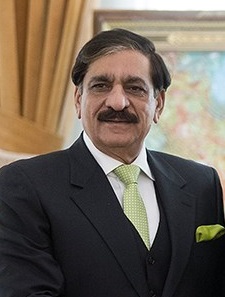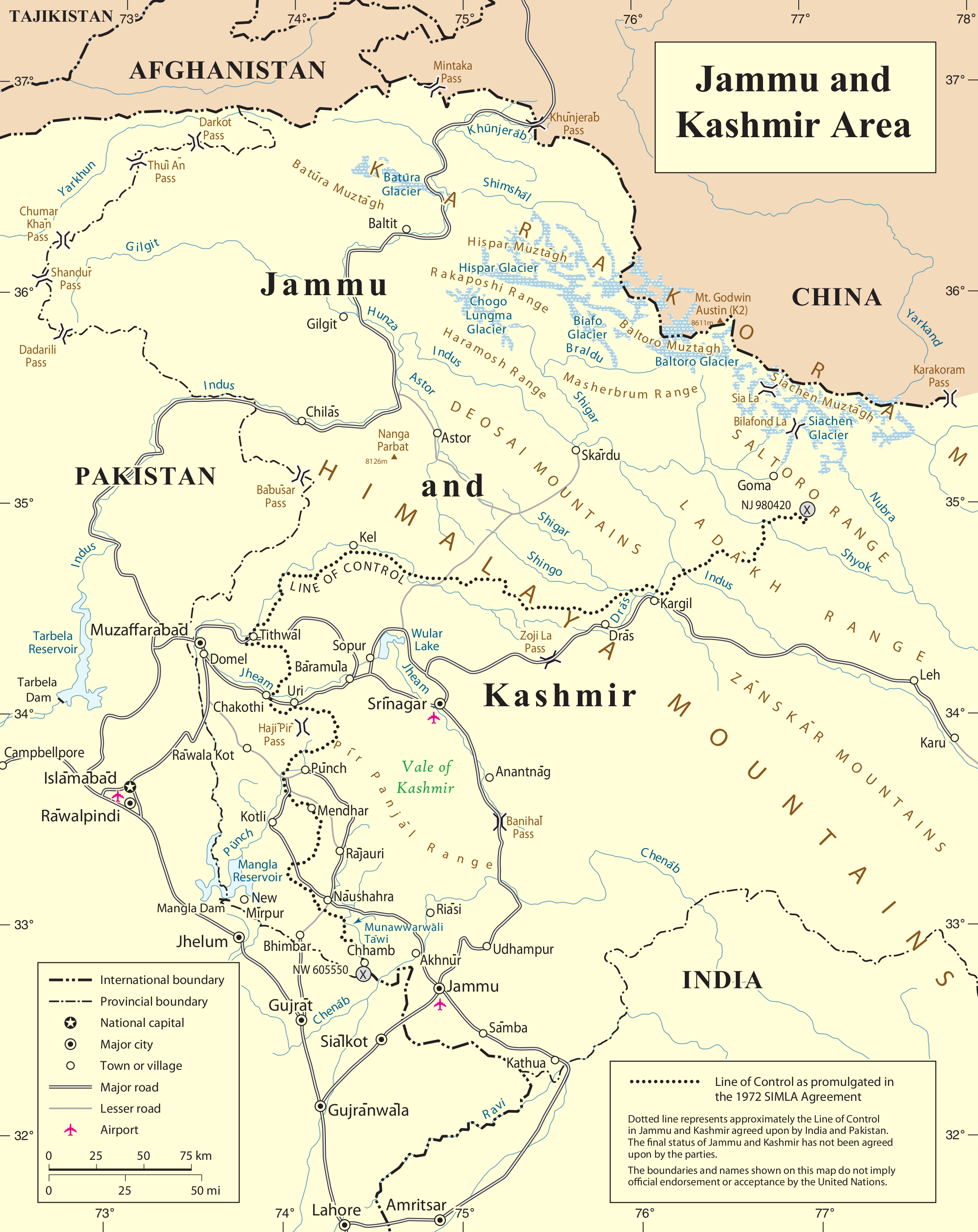|
Muhammad Haroon Aslam
Muhammad Haroon Aslam ( ur, ) is a retired 3-Star general of Pakistan Army. He was the Chief of Logistics Staff (CLS), of Pakistan Army. Education He holds master's degrees in Defence Studies and Political Science. Haroon Aslam is a graduate of Command and Staff College Quetta, Defence Services Command and Staff College (Bangladesh) and National Defence University Islamabad. Commands held In the past he served as Director Military Operations, commanded Pakistan Army's (Special Service Group). He also served as Corps Commander Bahawalpur from Mar 2011 to Jan 2013. In Swat he led Operation Rah-e-Rast. Under his command the SSG, during Operation Black Thunderstorm, liberated the Piochar Valley in Swat, which was occupied by terrorists. He was due to retire on 9 April 2014 but he retired on 27 November 2013 when Lt Gen Raheel Sharif was appointed as COAS. Currently he is serving as chairman Board Human Resource & Remuneration Committee & Board of Director (Askari Ba ... [...More Info...] [...Related Items...] OR: [Wikipedia] [Google] [Baidu] |
Fauji Foundation
Fauji Foundation ( ur, ), lit. ''Soldier Foundation''), (also known as Fauji Group) is a Pakistani conglomerates company which is active in fertilizer, cement, food, power generation, gas exploration, LPG marketing and distribution, financial services, and security services. The word "Fauji" () is an Urdu word that means "soldier" and the company was set up in order to provide employment opportunities to Pakistani ex-military personnel and to generate funds for the welfare of widows, and families of martyrs. History Fauji Foundation was established as a charitable trust in 1954, and operating on a completely self-sustaining basis, channels approximately 80% of the profits from commercial ventures into social protection programs that serve a beneficiary population representing approximately 7% of the country's population. Spending more than Rs. 23.8 billion since inception on welfare, the Foundation provides services in the areas of healthcare, education, educational stipen ... [...More Info...] [...Related Items...] OR: [Wikipedia] [Google] [Baidu] |
National Defence University, Pakistan
, native_name_lang = ur , image = National Defence University, Pakistan Logo.png , image_upright = , image_alt = , caption = Seal of the NDU , former_name = National Defence College , motto = ar, عَلَّمَ الْإِنْسَانَ مَا لَمْ يَعْلَمْ (al-Quran ('' 30:96:5'')) , mottoeng = "taught man which he knew not" , type = Military, public , established = , parent = , accreditation = , affiliation = , academic_affiliation = Higher Education Commission , endowment = , budget = , officer_in_charge = , chairman = , chairperson = , chancellor = Arif Alvi , president = Lt Gen. Nauman Mehmood , vice-president = RADM Muhammad Shfique , superintendent = , vice_chancellor = , director = , dean = Lubna Abid Ali , head_label = , head ... [...More Info...] [...Related Items...] OR: [Wikipedia] [Google] [Baidu] |
United Nations Observer Mission In Georgia
The United Nations Observer Mission in Georgia (UNOMIG) was established by United Nations Security Council Resolution 858 in August 1993 to verify compliance with a 27 July 1993 ceasefire agreement between the Republic of Georgia and forces in Abkhazia with special attention given to the situation in the city of Sukhumi, Georgia. It was also to investigate reports of ceasefire violations, attempt to resolve such incidents with the parties involved, and to report to the Secretary-General of the United Nations on the implementation of its mandate. 88 military advisors were authorized to be deployed to the region. It ended on 15 June 2009, when Russia vetoed an extension of the mission. The last observers left the region on 15 July 2009. The mission's original mandate was invalidated after renewed fighting broke out in the area in September 1993. UNOMIG was subsequently given an interim mandate by Security Council in November 1993 to maintain contacts with the parties involved and to ... [...More Info...] [...Related Items...] OR: [Wikipedia] [Google] [Baidu] |
United Nations
The United Nations (UN) is an intergovernmental organization whose stated purposes are to maintain international peace and international security, security, develop friendly relations among nations, achieve international cooperation, and be a centre for harmonizing the actions of nations. It is the world's largest and most familiar international organization. The UN is headquarters of the United Nations, headquartered on extraterritoriality, international territory in New York City, and has other main offices in United Nations Office at Geneva, Geneva, United Nations Office at Nairobi, Nairobi, United Nations Office at Vienna, Vienna, and Peace Palace, The Hague (home to the International Court of Justice). The UN was established after World War II with Dumbarton Oaks Conference, the aim of preventing future world wars, succeeding the League of Nations, which was characterized as ineffective. On 25 April 1945, 50 governments met in San Francisco for United Nations Conference ... [...More Info...] [...Related Items...] OR: [Wikipedia] [Google] [Baidu] |
Muhammad Ali Jinnah
Muhammad Ali Jinnah (, ; born Mahomedali Jinnahbhai; 25 December 1876 – 11 September 1948) was a barrister, politician, and the founder of Pakistan. Jinnah served as the leader of the All-India Muslim League from 1913 until the inception of Pakistan on 14 August 1947, and then as the Dominion of Pakistan's first Governor-General of Pakistan, governor-general until his death. Born at Wazir Mansion in Karachi, Jinnah was trained as a barrister at Lincoln's Inn in London. Upon his return to British Raj, India, he enrolled at the Bombay High Court, and took an interest in national politics, which eventually replaced his legal practice. Jinnah rose to prominence in the Indian National Congress in the first two decades of the 20th century. In these early years of his political career, Jinnah advocated Hindu–Muslim unity, helping to shape the 1916 Lucknow Pact between the Congress and the All-India Muslim League, in which Jinnah had also become prominent. Jinnah beca ... [...More Info...] [...Related Items...] OR: [Wikipedia] [Google] [Baidu] |
2001–2002 India–Pakistan Standoff
The 2001–2002 India–Pakistan standoff was a military standoff between India and Pakistan that resulted in the massing of troops on both sides of the India–Pakistan border, border and along the Line of Control (LoC) in the region of Kashmir. This was the second major military standoff between India and Pakistan following the successful detonation of nuclear weapon, nuclear devices by both countries in 1998, the first being the Kargil War of 1999. The military buildup was initiated by India responding to 2001 Indian Parliament attack, a terrorist attack on the Parliament of India, Indian Parliament in New Delhi on 13 December 2001 (during which twelve people, including the five terrorists who attacked the building, were killed) and the Jammu and Kashmir Legislative Assembly on 2001 Jammu and Kashmir legislative assembly attack, 1 October 2001 in which 38 people were killed. India claimed that the attacks were carried out by two Pakistan-based terror groups fighting in Jammu a ... [...More Info...] [...Related Items...] OR: [Wikipedia] [Google] [Baidu] |
Chagai-I
Chagai-I is the code name of five simultaneous underground nuclear tests conducted by Pakistan at 15:15 hrs PKT on 28 May 1998. The tests were performed at Ras Koh Hills in the Chagai District of Balochistan Province. Chagai-I was Pakistan's first public test of nuclear weapons. Its timing was a direct response to India's second nuclear test Pokhran-II, on 11 and 13 May 1998. These tests by Pakistan and India resulted in United Nations Security Council Resolution 1172 and economic sanctions on both states by a number of major powers, particularly the United States and Japan. By testing nuclear devices, Pakistan became the seventh country to publicly test nuclear weapons. Pakistan's second nuclear test, Chagai-II, followed on 30 May 1998. Background Several historical and political events and personalities in the 1960s and early 1970s led Pakistan to gradually transition to a program of nuclear weapons development, that began in 1972. Plans for nuclear weapons testing start ... [...More Info...] [...Related Items...] OR: [Wikipedia] [Google] [Baidu] |
Siachen Conflict
The Siachen conflict, sometimes referred to as the Siachen Glacier conflict or the Siachen War, was a military conflict between India and Pakistan over the disputed Siachen Glacier region in Kashmir. The conflict was started in 1984 by India's successful capture of the Siachen Glacier as part of Operation Meghdoot, and continued with Operation Rajiv in 1987. India took control of the Siachen Glacier and its tributary glaciers, as well as all the main passes and heights of the Saltoro Ridge immediately west of the glacier, including Sia La, Bilafond La, and Gyong La. Pakistan controls the glacial valleys immediately west of the Saltoro Ridge. A cease-fire went into effect in 2003, but both sides maintain a heavy military presence in the area. The conflict has resulted in thousands of deaths, mostly due to natural hazards. External commentators of have characterized it as pointless, given the perceived uselessness of the territory, and indicative of bitter stubbornness on both ... [...More Info...] [...Related Items...] OR: [Wikipedia] [Google] [Baidu] |
Awards And Decorations Of The Pakistan Armed Forces
The awards and decorations of the Pakistan Armed Forces recognize a service member's service and personal accomplishments while a member of the Pakistan Armed Forces. Together with military badges, such awards are a means to outwardly display the highlights of a service member's career. A few of these medals and awards are also given to or have in the past been given to Pakistani civil service officers or civilians with special government permission.The Government of Pakistan, Cabinet Division Gazette, 1988 November, Sec C-109, pp. 11–12. Decorations Wartime gallantry medals Peacetime distinguished service medals Civil Gallantry Awards Non-Operational Gallantry Awards Campaign / war medals Long service medals Wound stripes Commemorative medals Order of wearing See also *Military decoration *Orders, decorations, and medals of Pakistan The Pakistan Civil Awards were established on March 19, 1957, following the proclamation of Pakistan as an in ... [...More Info...] [...Related Items...] OR: [Wikipedia] [Google] [Baidu] |
Chief Of Army Staff (Pakistan)
The Chief of Army Staff ( ur, , Salar afwaj barri pakistan) ( reporting name: COAS), is the most senior officer in the Pakistan Army. It is one of the most powerful positions in Pakistan. This is the senior most appointment in the Pakistan Armed Forces who is a member of the Joint Chiefs of Staff Committee in a separate capacity, usually consulting with the Chairman joint chiefs to act as a military adviser to the Prime Minister and its civilian government in the line of defending the land borders of the country. The Chief of Army Staff exercise its responsibility of command and control of the operational, combatant, logistics, and training commands within the army, in contrast to the Chief of Staff of the U.S. Army. Due to its stature, the Chief of Army Staff have been instrumental in enforcing martial laws against the civilian government due to the meltdown of a civil-military relations in the past decades. The appointment, in principle, is constitutionally subjected to b ... [...More Info...] [...Related Items...] OR: [Wikipedia] [Google] [Baidu] |
Raheel Sharif
General Raheel Sharif (Urdu: ; born 16 June 1956), is a retired four-star army general of the Pakistan Army who served as the 9th Chief of Army Staff from 29 November 2013 to 29 November 2016. After his retirement as Pakistan's army chief, he was appointed as the commander-in-chief of the Islamic Military Counter Terrorism Coalition, a 41-nation alliance of Muslim countries headquartered in Riyadh, Saudi Arabia. Under General Raheel Sharif's command, the Pakistan Army carried out anti-terrorism operations across the country. The most important of these was in North Waziristan, namely Operation Zarb-e-Azb which eradicated taliban strongholds in the region and stabilized the entire country. He expanded the role of paramilitaries in Karachi which is widely credited with reducing the level of violence in Pakistan's commercial capital. The Pakistani military under his command has also supported the democratically elected government on the federal level and the Baloch provincial and ... [...More Info...] [...Related Items...] OR: [Wikipedia] [Google] [Baidu] |





